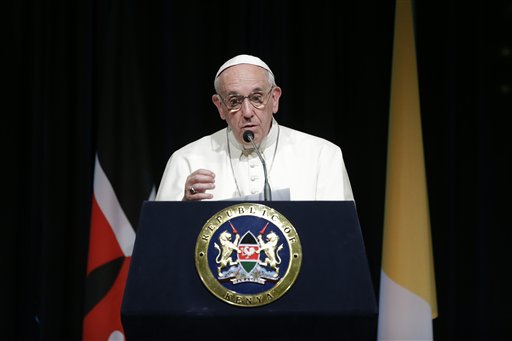
Pope Francis speaks at Nairobi’s State House, Wednesday, Nov. 25, 2015. Francis was received upon arrival Wednesday at Nairobi’s airport by President Uhuru Kenyatta on the first leg of a six-day pilgrimage that will also take him to Uganda and the Central African Republic, a country torn by fighting between Christians and Muslims. AP
NAIROBI, Kenya—Brushing aside concerns for his security, Pope Francis arrived in Kenya on Wednesday for his first-ever visit to Africa, including to Central African Republic, a country torn by fighting between Christian and Muslims.
Francis was received upon arrival at Nairobi’s airport by President Uhuru Kenyatta and Nairobi governor Evans Kidero. Kenyan Cardinal Njue and a host of bishops also welcomed the pope amid singing by traditional dance groups.
Francis is also scheduled to visit Uganda and the Central African Republic, which will mark the first time a pope has flown into an active armed conflict. The Central African Republic, or CAR, has been bloodied by a 2-year-old spiral of sectarian violence.
Asked while flying to Kenya in his Alitalia jetliner if he was concerned about security risks, the pope quipped: “I’m more afraid of the mosquitoes.”
Large crowds held back by hundreds of police gathered along the road from the airport and cheered as Francis’ motorcade passed by.
After greeting Kenyatta, Francis was presented with a bouquet of flowers by a boy and a girl and traditional dancers, some dressed in Maasai regalia, and choirs at the airport sang “karibu baba” in Swahili, lyrics which translate to “welcome father.”
Later, Francis was welcomed by an honor guard at the State House and a 21-gun salute.
The pope wants to bring a message of peace and reconciliation to parts of Africa torn by extremist violence.
Leaders in Africa heeded his message. Kenya Senator Joy Gwendo said she hoped the pope’spresence would help bring together reconciliation of Kenyans divided along tribal lines.
But security concerns are so high that the pope might be forced to make changes to his itinerary for the final leg of the trip.
On the eve of the departure, the Vatican spokesman, the Rev. Federico Lombardi, insisted that there were no new worrisome threats and that the pope planned to carry on with his scheduled program. But in a sign that the Vatican was on alert, Francis’ own chief bodyguard made a last-minute visit to CAR’s capital, Bangui, this week to get the latest security updates, and will only meet up with the pope once he lands in Nairobi on Wednesday afternoon.
The bodyguard, Domenico Giani, said upon his departure that “some small modifications” could be made to the itinerary if risks emerged, especially for the civilian population or the U.N. peacekeeping operation.
Before he gets to CAR, Francis is expected to press a host of issues close to his heart in Kenya and Uganda, including poverty, the environment and the need for interfaith dialogue.
He is also likely to challenge the countries’ political leaders on corruption. Transparency International ranked Kenya a lowly 145 out of 174 countries in its 2014 corruption perception index, while critics of Ugandan President Yoweri Musevni charge that official corruption has thrived under his three-decade rule.
Francis is likely to raise the issue during his first meeting Wednesday with Kenyatta, who declared this week that corruption is a national security threat to East Africa’s largest economy.
While in Kenya, Francis will also deliver an important environmental message at the U.N. Environment Program headquarters on the eve of make-or-break climate talks in Paris. He’ll also visit a Nairobi slum and seek to encourage young Kenyan Christians following the rampage by Islamic extremists who killed nearly 150 people at a college of mostly Christian students in April.
In Uganda, Francis will pray at the shrine to the country’s famous martyrs and celebrate a Mass in their honor.
The 45 Anglicans and Catholics were killed during the persecution of Christians in the region from 1885-1887. Pope Paul VI canonized the 22 African Catholics in 1964, and they remain an important reference point for Ugandan Catholics such that some 2 million people are expected at Francis’ Mass on Saturday.
Some uncomfortable issues may arise: The church’s opposition to condoms as a way to fight AIDS, and its support of local legislation criminalizing homosexuality are chief among them.
But on the whole, the pope’s visit is meant to tell the African church that it matters, said the Rev. Robert Dowd, professor of political science at the University of Notre Dame. “It has a crucial role to play in promoting justice and peace in societies where governments are not always accountable or responsive.”
The pope is due to arrive Sunday in Bangui. CAR has been highly volatile since early 2013, when Muslim rebels overthrew the president of a decade. Unprecedented sectarian violence followed and has continued to flare despite the presence of more than 11,000 peacekeepers and police.
Francis is expected to encourage an interfaith peace initiative involving the archbishop, the evangelical leader and Bangui’s imam.